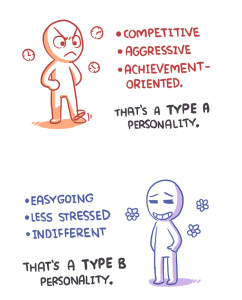Personality Theory: Type A vs Type B

Type A and Type B personality theory simply classes people as having one of 2 types of personality:
Type A: Highly strung, outgoing, adventurous, driven…
Type B: Easy going, relaxed, patient, reserved…
This theory was originally created in the 1950s as a way of categorising patients according to their risk of developing coronary heart disease.
Cardiologists Meyer Friedman and Dr Ray Rosenman concluded after a 10 year study of healthy men (in the 1950s) that those with what they classed as Type A behaviour had double the risk of coronary heart disease.
Though this research has undoubtedly had an influence on the development of psychological and personality type theory in the years since, relating to the connection between mental and physical health – and is a useful and simple theory for reference, it has also been widely criticised (mainly due to too many other factors/variables not being accounted for in the original study, such as diet).
Despite the criticisms, the terms ‘Type A’ and ‘Type B’ are easy to use and often still are by some to describe general character traits fitting the original theory.
Extreme Type A personalities are often high-achieving workaholics who push themselves to their limits of success and have a low tolerance for failure or deadlines being missed, constantly striving for more and better. These types are classic cases for burn-out, stress, anger issues etc.
There is also an AB type for those who cannot easily be categorised as A or B.
Type B is clearly more relaxed and therefore less susceptible to the medical conditions which are a higher risk in Type A personalities. A Type B person may be seen by a Type A person to be so disinterested as to be a waste of space, often described as being disengaged.
Such clashes could lead to unfair problems in the workplace with hostility brought about purely by personality type (rather than actual work tasks, capacity or ability) causing hostility to surface – usually from the Type A personality, directed at the Type B personality (though it could also be the other way around).
Final Thought
This is clearly a very basic model of personality type when compared to some of the more sophisticated personality type theories such as Myers Briggs or Belbin but can still be useful to understand behaviours or as a communication tool.
Like all such simple models, the context in which this is used becomes a key to its effective use. Use it as a guide rather than a blunt instrument.
P.S.: I am slowly getting through my list of 100 Management Models and When To Use Them so if you want to see more really useful models on our core topics of business success, lifestyle design and financial freedom, do check out that list.

Comments
Personality Theory: Type A vs Type B — No Comments
HTML tags allowed in your comment: <a href="" title=""> <abbr title=""> <acronym title=""> <b> <blockquote cite=""> <cite> <code> <del datetime=""> <em> <i> <q cite=""> <s> <strike> <strong>